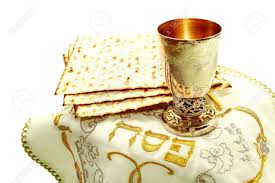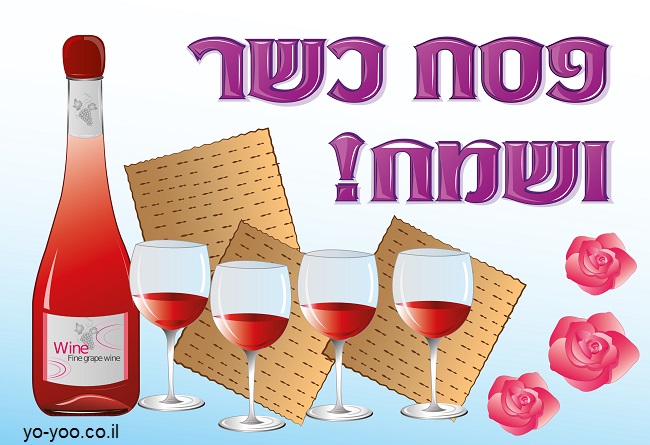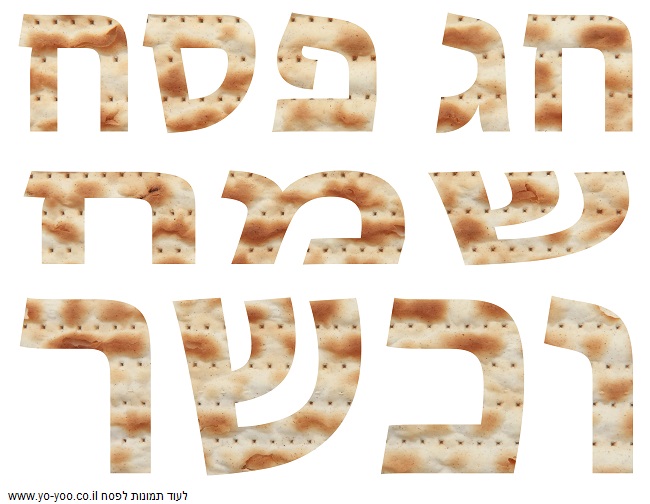Without a Chashash Chometz

The Tzchebiner Rav, HaRav Dov Berish Weidenfeld zt'l, was famous for his exceptional modesty despite his greatness in Torah. At one time when a group of boys came to talk to him, a boy told the Tzchebiner Rav that on chol hamoed Pesach he saw the Rav's sefer on the Chazon Ish's table and the Chazon Ish was studying from it.
When the Tzchebiner Rav heard that, he remarked: "Yes, he was studying from it on chol hamoed Pesach. Surely the Chazon Ish was looking for seforim that he does not use the whole year and therefore there was no chashash chometz in them."
(Orchos Chasichecho)
For His Lovingkindness Has Overwhelmed Us
The famous ger tzedek, the Count Potozky, was tortured terribly before he made his public kiddush Hashem. Before he was taken out to be killed it seems that some of his judges had some inkling of the truth. They asked the count to forgive them and not take revenge on them in Olam Habo. He answered wittily:
"Dovid Hamelech a'h writes in Tehillim (117:1): `Praise Hashem all nations . . . for His kindness has overwhelmed us.'
"Why do the non-Jews have to praise Hashem because His kindness has overwhelmed the Jews?
"This can be explained by a moshol.

"A king's small son lost his way. A villager found him, took him home, and raised him according to his way of living which included forcing the unfortunate prince to do disgraceful work. Once the ill-fated prince found a new toy but the villager stole it from him.
"One day people heard a clamor of wagons and horses. It seems that the king himself was coming to visit that village. After he arrived the villagers were given permission to appear before him and tell the king of any complaint or argument they had and the king promised he would try to fulfill their wishes. The prince dauntlessly went before the king to complain that the villager had stolen his toy. The king recognized his lost son and their simchah was boundless.
"When the villager who had stolen the toy from the prince saw the great honor the king gave his son, he fell before the boy and cried bitterly. The villager requested from the boy not to be punished for his stealing the toy that was so precious to him. The prince answered immediately: `Do not think that such worthless objects are meaningful to me now. After I have been elevated from my lowly state that toy has no value for me and its being taken away from me is insignificant.'
"The Torah writes `Praise Hashem all nations.' They should not think that we will take revenge on them for their harming us `for His kindness has overwhelmed us' and He has elevated us. Such matters are at the present meaningless to us and we do not pay any attention to them.
"I too," said the Count Potozky to the judges, "after my nefesh is refined I will not care about all the tortures to my lowly body. I will not be revengeful nor angry at those who pursued me and tormented me."
R' Boruch Ber Leibowitz zt'l, the rosh yeshiva of Yeshivas Kamenetz, said that on one of the Vilna Gaon's visits to the ger tzedek's prison cell, he found the ger tzedek crying. The Gaon was astonished and asked: "Why should someone about to be moseir nefesh for kiddush Hashem cry? You should be moseir nefesh with simchah."
The Count Potozky answered that he is not crying because of his imminent death. What bothered him was that he had not become implanted within am Yisroel: He had no father, no children or brothers who were Jewish. The Gaon answered that we find in the Midrash on the posuk, "I am the first and I am the last" (Yeshaya 44:6) that "I am the first" means that I have no father, "I am the last" means that I have no son.
What is the actual significance of the Midrash. It is obvious that someone without a father is the first of his line and if he dies and has no sons he is the last. The Midrash really means that "I am first" for anyone who has come to shelter under the shadow of the Shechinah. "I am last" for anyone who has no children, for I am better for him than ten children.
(Hagodos Talelei Oros)
With a Mighty Hand
R' Yitzchok Eliyahu Landa zt'l of Vilna explained with a moshol:

A person was imprisoned for disobeying the law and living in the country without a visa. One of his relatives, a prominent person living in that town, heard about his arrest and immediately sent a messenger requesting the jail warden to free his friend without delay. This request enraged the warden since it was humiliating that someone would instruct him to free prisoners. Not only did he not discharge the prisoner, he even gave orders to punish him more severely and had him perform hard, backbreaking labor. The messenger returned to the prominent townsman complaining that his efforts had only made things worse for the imprisoned friend.
When the townsman heard the messenger's complaints he responded: "Even before I sent you I knew that this would be the result, but I sent you anyway. By doing so I have woven a plot against the jail warden. Before I had spoken to him I had no way to help my friend since the jail warden had acted according to the law. He did not hit him nor did he oppress him. After he became enraged and as a result punished my relative more severely than the law requires, I can complain to his superior and protest at his being unfairly treated. When his superior will examine my complaint he will find that my friend was punished by mistake and will free him and punish the jail warden."
The lesson we learn from this is that as long as Yisroel were ordinary slaves in Egypt it was impossible to punish Pharaoh since HaKodosh Boruch Hu had decreed our being enslaved.
Hashem therefore sent Moshe, His chosen one, to say: "Let My people go" (Shemos 5:1), so that Pharaoh will become enraged and haughtily proclaim (v.2): "Who is Hashem that I should obey His voice to let Yisroel go?" Not only did Pharaoh refuse to set bnei Yisroel free he increased their work. He decreed that they should themselves gather the straw to make bricks without diminishing their daily quota. When bnei Yisroel were unable to produce the same amount of bricks the cruel Egyptians sunk Jewish children in the buildings. This "hard labor" was not part of the gezeiroh; it was something Pharaoh himself had added.
Afterwards Moshe argued to HaKodosh Boruch Hu: "Since I came to Pharaoh to speak in Your name he has done evil to this people" (ibid.; ibid.; 22). Hashem responded to that argument: "Then Hashem said to Moshe, Now you shall see what I will do to Pharaoh, for with a mighty hand shall he drive them out of the land" (v. 23). The "mighty hand" Pharaoh has used against you will bring the release of bnei Yisroel from bondage. Pharaoh will be punished until he sends bnei Yisroel away from his land.
(Talelei Oros)
Hashem is On My Side; I will Not Fear
What is important is that Hashem is with us!
Maran HaRav Isser Zalman Meltzer zt'l said: This can be compared to a father walking with his son in the depth of the forest roaming with him among the trees. The son was not afraid of the wild animals since his father was holding his hand and protecting him from all evil. Even when the boy was not holding his father's hand, the father was still walking at his side. The father said: "If you want to walk near me and not hold my hand that is fine with me, but do not wander off since you might get lost and get into trouble."
The boy saw some cherries in the forest and was tempted to go and pick them. He strayed from the path, walked right into the forest's thick shrubbery, saw a fruit and took it. He saw a butterfly and ran after it. Suddenly he found himself surrounded by trees and entangled with bushes. He tried to find a way out of the shrubbery but saw that he was going deeper and deeper into the forest. Night started falling and the boy heard the roar of the wild animals. The boy was startled and started crying loudly: "Father! Father! Where are you? Come back to me. Find me. I was so foolish not to listen to you. How bad it is that I did not obey what you told me!"
In the middle of his crying he heard a sound behind him and a hand slapped him on his back. The boy turned around and saw it was his father who had hit him for his senseless behavior. The boy was delighted that he could return to his father and no longer be alone. He was no more in danger and need not be afraid. He would return to the right path leading home. His father hit him for his misbehavior in straying off the road. The son did not care and cherished the hand that hit him and kissed his father with tears of happiness. "Let him hit me," he said, "What is important is that he is here and is looking after me."
This is what Dovid Hamelech says in Tehillim "Hashem is on my side; I will not fear."
(Arzei HaLevonon)
The Plague of Hail
"A place where a person finds himself is a primary cause" (Sanhedrin 14b).
HaRav Boruch Ber Leibowitz zt'l, the rosh yeshiva of Kamenetz Yeshiva, explained: "Moshe said to him, As soon as I leave the city, I will spread out my hand to Hashem" (Shemos 9:29). Rashi explains: "...but inside the city [Moshe] did not pray since it was full of avodoh zorah." Chazal teach us that those Egyptians who were fearful of Hashem chased their cattle inside the homes. Since the avodoh zorah of the Egyptians was the cattle Moshe had to leave the city before praying to stop this plague.
But let us understand this. Even if the city were full of avodoh zorah why was it necessary to leave the city altogether. Was Pharaoh not able to designate one room in the whole city for Moshe's prayers? When Lovon met Eliezer he told him, "I have emptied out the house" (Bereishis 24:31). Rashi explains that he meant to say that he had emptied it from avodoh zorah. Surely Pharaoh could have found one room or one corner without any idols so Moshe could pray there.
It seems that there was a smell of avodoh zorah all over the city even where there actually was no avodoh zorah.
R' Boruch Ber's Rav, Maran R' Chaim HaLevi of Brisk, told him that his own father, the Beis HaLevi zt'l, once happened to visit some house and remarked that he feels tumah there. People inquired into the town's history and found out that a church was once situated there. The Brisker Rav explained that it was not that the Beis HaLevi knew this through the ruach hakodesh, which he undoubtedly had, but his refined nefesh was able to sense tumah.
R' Boruch Ber said that Slobodka in the vicinity of Kovna was zocheh to have two notable yeshivos (Slobodka- Knesses Yisroel and Knesses Beis Yitzchak-Kamenitz) since in all of the vicinity there was no church.
I will cite a proof to this. "Then shall the korbon of Yehuda and Yerushalayim be pleasant to Hashem as in the days of old and in former years" (Malachi 3:4). Chazal (Vayikra Rabbah 7:4) write that the korbon "as in the days of old" refers to the korbon of Hevel, and "in former years" refers to the korbon of Noach. In neither of these times was there any avodoh zorah.
Is this not amazing? On the day Shlomoh Hamelech inaugurated the Beis Hamikdash, which was alluded to as being "the simchah of Hashem's heart," he sacrificed a thousand olos. However, these olos did not give the same pleasantness as was present at the time of Hevel and Noach when there was no avodoh zorah at all.
*
The same will be in the time of Moshiach when all the idols will disappear from the world. At that blessed time the korbon to Hashem will have that same pleasantness.
Now we understand why Moshe Rabbenu did not pray in a corner of Pharaoh's castle but was forced to leave the city completely.
R' Boruch Ber added that people say that when the gaon R' Eliyahu Ragolar zt'l left Slobodka to become the Rav of Kalish he remarked that he feels he cannot grow in Torah in Kalish as he did in Slobodka since there is a church in Kalish.
(Arzei HaLevonon)




